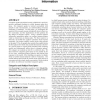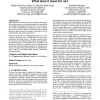183 search results - page 35 / 37 » Learning Social Preferences in Games |
143
click to vote
CORR
2011
Springer
14 years 9 months ago
2011
Springer
Modeling the behavior of imperfect agents from a small number of observations is a difficult, but important task. In the singleagent decision-theoretic setting, inverse optimal co...
115
click to vote
ATAL
2008
Springer
15 years 3 months ago
2008
Springer
Computer agents participate in many collaborative and competitive multiagent domains in which humans make decisions. For computer agents to interact successfully with people in su...
122
click to vote
SIGCSE
2006
ACM
15 years 7 months ago
2006
ACM
Experimentation has shown that in-class educational technologies, by permitting anonymous, authored participation, can dramatically alter student communications in the classroom. ...
100
click to vote
SOCRATES
2008
15 years 3 months ago
2008
The purpose of this paper is to build a picture of knowledge construction models in online education. The study describes the knowledge construction process of a group of vocation...
126
Voted
CANDC
2009
ACM
14 years 11 months ago
2009
ACM
There has been much recent interest in the development of tools to foster remote collaboration and shared creative work. An open question is: what are the guidelines for this proc...


